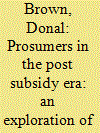|
|
|
Sort Order |
|
|
|
Items / Page
|
|
|
|
|
|
|
| Srl | Item |
| 1 |
ID:
183112


|
|
|
|
|
| Summary/Abstract |
Energy service business models (ESBMs) are potentially critical to reducing household energy demand and mitigating climate change. These models are predicated on a shift from the ‘throughput’ sale of energy commodities, towards providing ‘useful’ or ‘final’ energy services. However, the conceptual delineation of these models and their different variants remains opaque in the literature. In this paper, we seek to clarify this issue through the identification of a typology of ESBMs. Through a series of 53 interviews and 7 stakeholder workshops we explore contemporary domestic ESBM examples in Europe. We find that while more basic energy supply contracts are commonplace, models which deliver energy saving performance or final energy services are rarer. We subsequently identify barriers to the adoption of these business models, before proposing 13 policy recommendations. We conclude that the ‘energy throughput orthodoxy’ which has governed liberalised energy markets will need to be challenged for these models to have a significant future impact.
|
|
|
|
|
|
|
|
|
|
|
|
|
|
|
|
| 2 |
ID:
169871


|
|
|
|
|
| Summary/Abstract |
This paper explores the evolving renewable energy ‘prosumer’ phenomenon in the United Kingdom (UK). It identifies and evaluates how prosumer business models can exist beyond direct subsidy and the range of prosumer business model archetypes currently in operation. Through a series of in-depth interviews and document analysis, the paper identifies the key opportunities and challenges for these innovative energy business models. The analysis shows that recent developments in technology such as the diffusion of smart meters, li-ion batteries, peer-to-peer trading platforms and electric vehicles are opening up a range of new value propositions, which in turn are beginning to be exploited by a range of new business models. In many cases the regulatory, financing and institutional governance landscape of the UK lags behind, however, inhibiting these emerging business models. Moreover, these business models rely on managing a complex set of values for consumers that reach deeper into their lives than traditional tariffs. Thus, successful business models must manage this complexity if they are to be adopted by the disengaged majority. Energy policy and energy practitioners can leverage these emerging trends in service of a low carbon energy transition by adopting ‘ten principles’ of prosumerism; and six UK policy recommendations.
|
|
|
|
|
|
|
|
|
|
|
|
|
|
|
|
| 3 |
ID:
166405


|
|
|
|
|
| Summary/Abstract |
Improving energy efficiency, de-carbonising heating and cooling, and increasing renewable microgeneration in existing residential buildings, is crucial for meeting social and climate policy objectives. This paper explores the challenges of financing this ‘retrofit’ activity. First, it develops a typology of finance mechanisms for residential retrofit highlighting their key design features, including: the source of capital; the financial instrument(s); the project performance requirements; the point of sale; the nature of the security and underwriting the repayment channel and customer journey. Combining information from interviews and documentary sources, the paper explores how these design features influence the success of the finance mechanisms in different contexts. First, it is shown that a low cost of capital for retrofit finance is critical to the economic viability of whole-house retrofits. Second, by funding non-energy measures such as general improvement works, finance mechanisms can enable broader sources of value that are more highly prized by households. Thirdly, mechanisms that reduce complexity by simplifying the customer journey are likely to achieve much higher levels of uptake. Most importantly we discuss how finance alone is unlikely to be a driver of demand for whole-house retrofit, and so instead should be viewed as a necessary component of a much broader retrofit strategy.
|
|
|
|
|
|
|
|
|
|
|
|
|
|
|
|
|
|
|
|
|